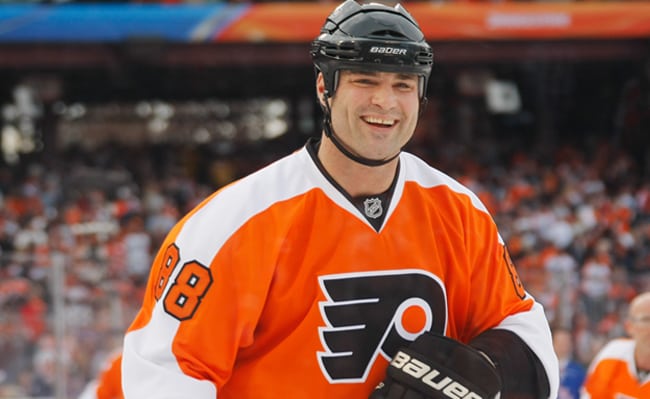
Does Lindros deserve a Hall call?
 Does Lindros deserve a Hall call?
Does Lindros deserve a Hall call?It’s Friday, it’s mailbag, it’s me. Thanks as always to everyone who took a moment to submit a question. Now let’s get to this week’s batch:
Adam, should Eric Lindros be considered a Hockey Hall of Fame candidate? I know they are thinking that he deserves to be in, but I don't think he represents what the Hall is about. Do you think the Hall of Fame is beginning to accept more people who don't deserve that honor?
Andrew Dale, Sault Ste. Marie, Ont.
Andrew,
If you’re looking for a guy who thinks the HHOF is too lax in its standards for induction, I’m not that guy. I’d take issue with your suggestion Lindros doesn’t represent what the Hall is “about.” To see exactly what the Hall is about when it comes to honoring players, you need only look at the criteria on the HHOF website:
“Playing ability, sportsmanship, character and their contribution to the team or teams and to the game of hockey in general.”
Now, there certainly are those who take issue with Lindros in the character element due to some of his decisions during his playing days. But by-and-large, I don’t think he was nearly the bad apple some people made him out to be. In fact, his concern for his physical health turned out to be perfectly appropriate and that’s why I wrote a couple years ago that the hockey world owed him an apology.
But beyond that, can anyone make the argument Lindros wasn’t a near superhuman force during his best years? Yes, those years were limited, but we’re talking about a Hart Trophy-winning player who was as dominant as anyone during his peak.
That Lindros didn’t win a Stanley Cup doesn’t take him out of HHOF contention for me. There are many players in the Hall who weren’t that fortunate during their career. When it came to incredible playing ability and undeniable contributions to his teams, he definitely qualifies to receive one of the sport’s highest honors.
Hey Adam, With the Coyotes saga dragging on for another year in the desert with limited financial means, my question is: why hasn't some Russian billionaire come in to try and get his foot in the door yet? We've seen it in the NBA (the Nets) and in European soccer (AS Monaco): Russian Billionaire X buys a struggling team and plasters the stadium and team jerseys with money; he also gets to play king and has his name all over the media. You could say there's little love for the sport in this kind of transaction, but it's still a win-win for both parties (especially the players). Aren't Russians interested in the NHL? Or is the league actively preventing these kinds of hostile takeovers from happening? Thanks in advance and keep up the good work!
Chris Dragan, Ottawa
Hey Chris,
Interesting question, but I’m afraid that there simply aren’t many billionaires of any national or ethnic background who are interested in throwing good money after bad in the Arizona desert. As I’ve argued for years, the biggest albatross hurting the Coyotes franchise was the decision to situate the arena not in Phoenix proper, but in suburban Glendale. Until an owner figures out how to extricate himself from that arena lease, he or she is guaranteed to lose money.
I can see why Russian oligarchs chose to invest in the Nets or in European soccer teams: there clearly is a market and the potential for profit in both those situations. In Phoenix, there are no such conditions for success.
Hi Adam, I look forward to your column every Friday. Keep up the great work! I noticed this off-season teams were announcing they had come to agreements with free agents before July 5, but the deal would be official when free agency began (Vinny Lecavalier for example). Was this only applicable to players who had been bought out? I never remember hearing of something like this before. Thanks!
Mike Collins, Stormville N.Y.
Hi Mike,
Thanks for the kind words. Yes, this year was an anomaly as far as the amount of time bought-out NHLers had to shop their wares around before hitting the open market with other free agents on July 5. However, don’t forget that, this year, a new wrinkle was added that allowed teams to talk to kick the tires on all free agents 48 hours prior to unrestricted free agency day.
This anomaly will continue next season, as there will be one more window in which to amnesty contracts next summer. In addition, the 48-hour tire-kicking period will extend to five full days next summer and be a permanent fixture in all off-seasons after that. There was some significant confusion among NHL GMs this time around regarding the particulars of what they could and couldn’t do in this window, but confusion and clarification is to be expected with all new rules and regulations the league implements.
Hi Adam! I was wondering – with all the players’ injuries and sicknesses they endure throughout the season, what kind of medical coverage or insurance do they receive? Is it part of the collective bargaining agreement or their contract mandating teams provide their players and staff with health coverage, or are they asked to seek their own insurance elsewhere out of their own pocket? Thanks!
Christine Gunn, Tampa Bay
Hi Christine!
Yes, the CBA mandates all teams are to provide health and life insurance for players. They’re not independent contractors (as, say, professional wrestlers are), they’re employees of the team; as such, they’re entitled to coverage that will protect themselves and their families.
Ask Adam appears Fridays on THN.com. Ask your question on our submission page. For more great profiles, news and views from the world of hockey, subscribe to The Hockey News magazine. Follow Adam on Twitter at @ProteauType.